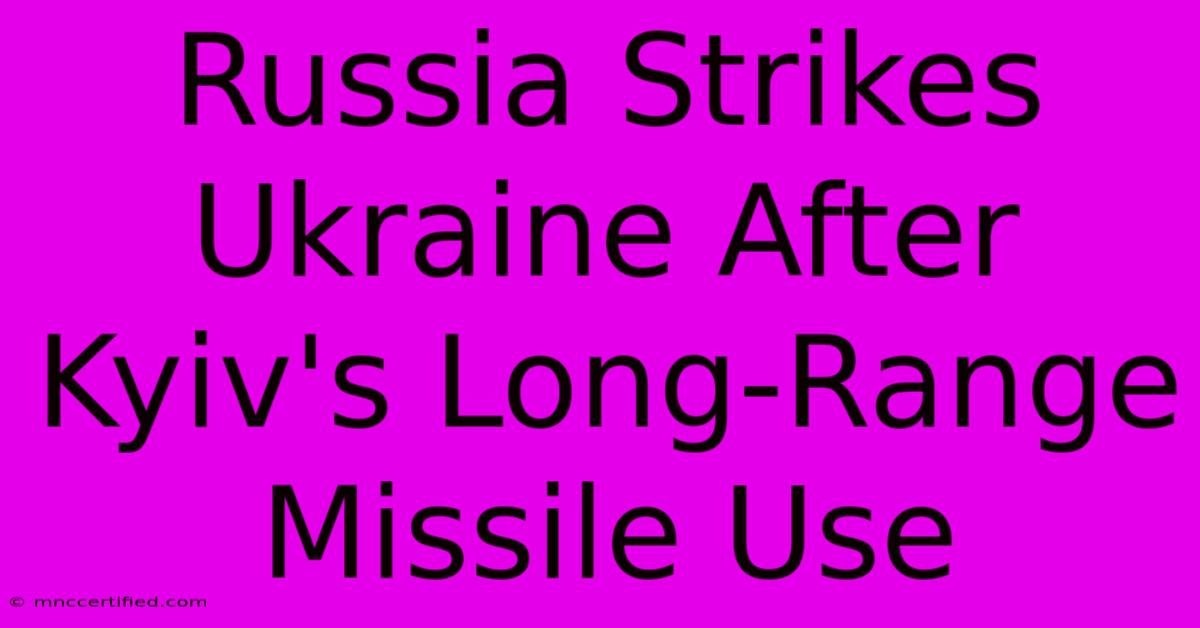Russia Strikes Ukraine After Kyiv's Long-Range Missile Use

Table of Contents
Russia Strikes Ukraine After Kyiv's Long-Range Missile Use: Escalation of the Conflict?
The ongoing conflict in Ukraine took a sharp turn following Kyiv's reported use of long-range missiles, prompting retaliatory strikes from Russia. This recent escalation raises serious concerns about the potential for further intensification of the war and the broader geopolitical implications. Understanding the context of this event requires examining the key developments and analyzing the potential consequences.
Kyiv's Long-Range Missile Use: A Turning Point?
Reports indicate that Ukraine employed long-range missiles, targeting strategically important locations within Russian territory. While the specifics of these attacks remain subject to verification and independent investigation, their occurrence marks a significant escalation in the conflict. This action represents a departure from previous Ukrainian strategies and could signify a shift in the dynamics of the war. The exact type of missiles used and the extent of the damage caused are still under scrutiny by international observers and intelligence agencies. Verification of these reports is crucial to understanding the full impact on the conflict.
Strategic Implications of Long-Range Strikes
The use of long-range missiles by Ukraine carries several strategic implications. Firstly, it demonstrates Kyiv's growing capacity to strike deep within Russian territory, potentially impacting Russia's ability to sustain its military operations. Secondly, it could signal a shift in Ukraine's overall military strategy, indicating a willingness to engage in more aggressive actions. Thirdly, it could lead to further escalation, prompting a more forceful response from Russia and potentially dragging other international actors into the conflict.
Russia's Retaliatory Strikes: A Response to Escalation
Following reports of Ukrainian long-range missile attacks, Russia launched retaliatory strikes targeting various locations within Ukraine. These strikes reportedly targeted key infrastructure, including energy facilities and military installations. The intensity and scope of these retaliatory strikes are subject to ongoing assessment and reporting from multiple sources. Independent verification of these reports is crucial for accurate assessment of casualties and damage.
Analyzing Russia's Response
Russia's response can be interpreted through various lenses. It serves as a direct demonstration of its capability and willingness to retaliate against perceived threats. The targeting of infrastructure highlights a potential strategy to cripple Ukraine's ability to defend itself and sustain its operations. The intensity of the response may also be an attempt to deter further long-range missile attacks from Ukraine. Analyzing Russia’s response requires considering the potential implications for the civilian population and the overall humanitarian impact of the conflict.
International Implications and Future Outlook
This recent escalation has profound international implications. The potential for further escalation, the risk of wider conflict, and the humanitarian consequences are all cause for serious international concern. The international community's response to this latest development will be critical in shaping the future trajectory of the conflict. The international community, including NATO and the UN, faces the significant challenge of de-escalating the conflict and ensuring humanitarian aid reaches those affected.
Potential for Wider Conflict and International Response
The increased use of long-range weaponry significantly raises the stakes. The potential for miscalculation and accidental escalation towards a wider conflict is a considerable concern. The international response will be crucial in mitigating this risk. Strong diplomatic efforts are necessary to de-escalate the situation and encourage dialogue between the warring parties. Continued international monitoring and pressure are essential to prevent further escalation.
Conclusion: Navigating a Critical Juncture
The use of long-range missiles by Ukraine and Russia's subsequent retaliatory strikes represent a significant turning point in the ongoing conflict. This development demands careful analysis and a measured international response to prevent further escalation and minimize humanitarian suffering. The international community must prioritize diplomatic solutions and continue to provide humanitarian support to the people of Ukraine while navigating this complex and volatile situation. The future trajectory of the conflict remains uncertain, and continued monitoring of the situation is vital for informed analysis and effective response.

Thank you for visiting our website wich cover about Russia Strikes Ukraine After Kyiv's Long-Range Missile Use. We hope the information provided has been useful to you. Feel free to contact us if you have any questions or need further assistance. See you next time and dont miss to bookmark.
Featured Posts
-
Luke Skywalker Joins Skeleton Crew
Nov 22, 2024
-
Florida Law Motorcycle Insurance
Nov 22, 2024
-
Wayne And Coleen Rooneys Conflicts
Nov 22, 2024
-
E Coli Risk Ground Beef Recall
Nov 22, 2024
-
Live Cricket Score India Vs Australia
Nov 22, 2024